The Hardest Things About Being a Small Business Owner

Thinking about starting your own business? Or maybe buying one?
We say go for it!
We think everyone should own some type of business. It’s great for extra cash flow and financial security and gives you the opportunity to flex your entrepreneurial skills.
But, as thrilling as it is to be your own boss, let's not sugarcoat it – being a business owner also comes with its fair share of challenges.
In the list below, we’ve compiled ten reasons why being a small biz owner is difficult and tips to overcome them.
The Hardest Things About Being a Small Business Owner:
Financial Uncertainty: Cash flow can feel like a rollercoaster ride, with peaks and valleys that keep you on edge.
✔️ Tip: Create a detailed budget, keep track of expenses religiously, and consider diversifying your revenue streams to mitigate financial risks.
Wearing Many Hats: As a small business owner, you're the CEO, accountant, marketer, customer service rep – you name it!
✔️ Tip: Learn to delegate tasks where pos...
Life is Like Underwear, Change is Good.
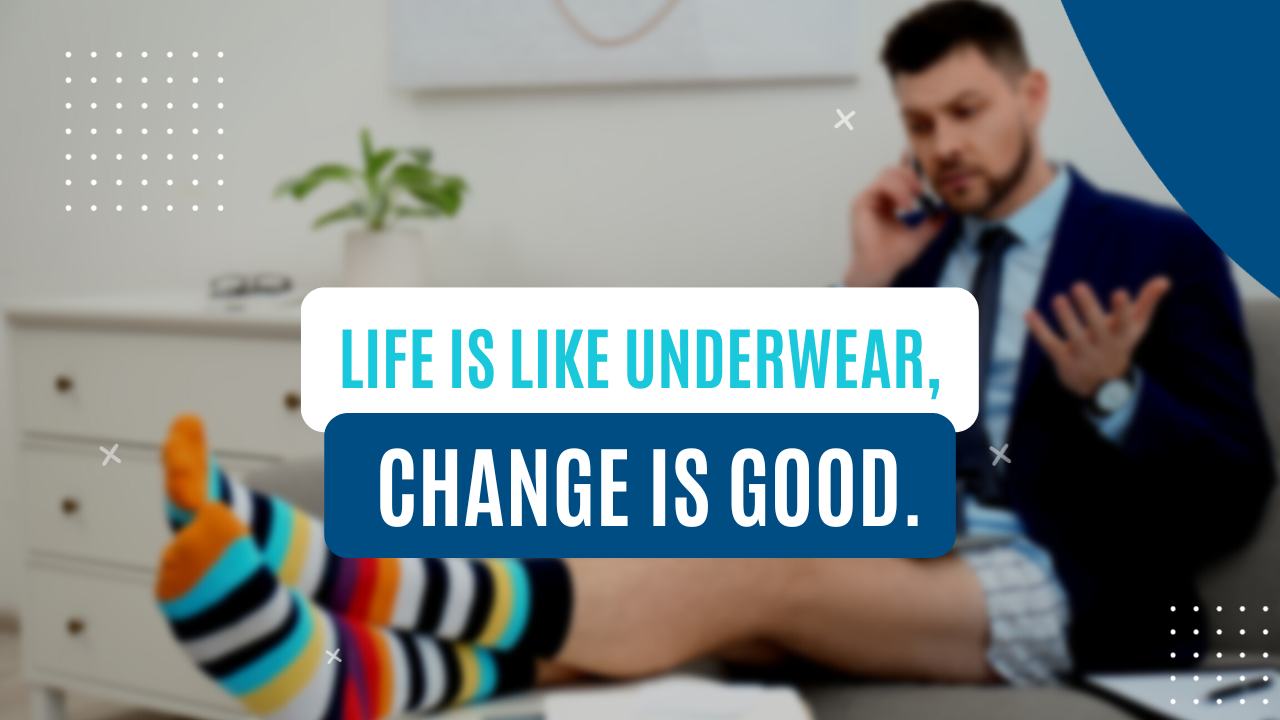
Let's face it: life can be a lot like underwear – it gets a bit uncomfortable when it stays the same for too long. And just like the undergarments we hope you swap out on a regular basis, change is not only good; it's essential, especially when it comes to your business.
Whether it's a shift in market trends, new technology, economic fluctuations, or unforeseen challenges like the COVID-19 pandemic, small business owners must be prepared to adapt and evolve to thrive in an ever-changing landscape.
Navigating change as a small business owner can be challenging, but with the right strategies, it can also be an opportunity for growth and innovation. Below are some key strategies for successfully navigating change as a small business owner.
1. Embrace a Growth Mindset
If you want to handle change like a boss, the first thing you need to do is adopt a growth mindset. Understand that change is a totally normal part of business and can actually be a great opportunity to learn and imp...
The Four Types of Entrepreneurship: Finding Your Path to Success

Entrepreneurship is a multifaceted world, with diverse opportunities and avenues for those with the vision, drive, creativity, and determination to bring their ideas to life. It’s commonly broken down into four categories: small business, scalable startup, large corporation, and social enterprise. Each type of entrepreneurship offers its own rewards, opportunities, and of course - challenges.
So, how do you know which one is the right one for you? Let's dive deeper into each of these types of entrepreneurship to help you figure out which one might be the best fit for your unique skill set and goals.
Small Businesses
Unless you’re new here, you already know how we feel about small businesses. (We like ‘em. A lot.) They’re an integral part of our economy, often characterized by their local or niche focus and a commitment to serving the needs of their immediate community. Small business owners typically have more control over their operations and a strong connection with their c...
Striking the Balance: Work-Life Harmony for Business Owners and Entrepreneurs

As business owners and entrepreneurs, we are often consumed by our passion for our ventures, working tirelessly to bring our dreams to life. And so it’s no wonder it’s so easy to neglect the importance of work-life balance. However, maintaining a healthy equilibrium between our professional and personal lives is crucial for long-term success and overall well-being.
Here are two primary reasons why work-life balance matters:
- Sustainable Success: Achieving work-life balance is not just about feeling good right now, but it’s also about setting yourself up for success in the long run. If you consistently neglect personal well-being, you’ll end up feeling burnt out, get less done, and (probably) start making poor choices. Striking a balance allows you to maintain energy levels, enthusiasm, and creativity, enhancing your long-term professional achievements.
- Improved Health and Relationships: A healthy work-life balance promotes physical and mental well-being. It reduces stress, anxie...
The Highs (and Lows) of Owning a Business
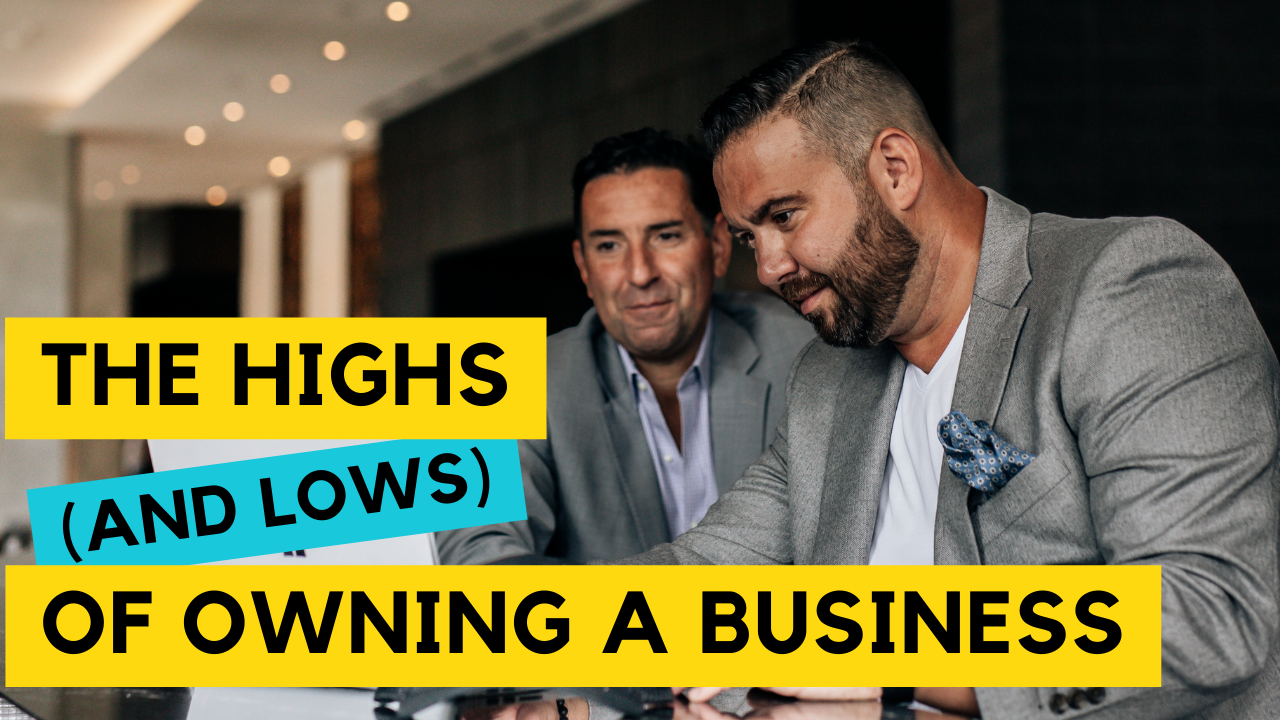
Owning a business can be a fulfilling and exciting experience, but it's not all smooth sailing. Sometimes it's more akin to a trip aboard the Titanic. Or it is being stuck on one of those cruise ships where everybody gets food poisoning. It can be beautiful sunsets and neverending Pina Coladas on the upper deck. It can also be dysentery and an unfortunate starboard encounter with an iceberg. And more often than not, it's a little bit of both.
Still, no risk, no reward, right?
There are plenty of highs and lows when it comes to owning your own business. And even knowing what we know (and what we've seen), we'd throw ourselves onto that ship every single time. But it's a decision everyone has to make for themselves. If you're just starting out or thinking about buying or starting a business of your own, keep in mind some of the high points and the low points you will encounter on the way.
High - Independence and freedom: One of the biggest perks of owning a business is being your...
How are You Getting Paid?
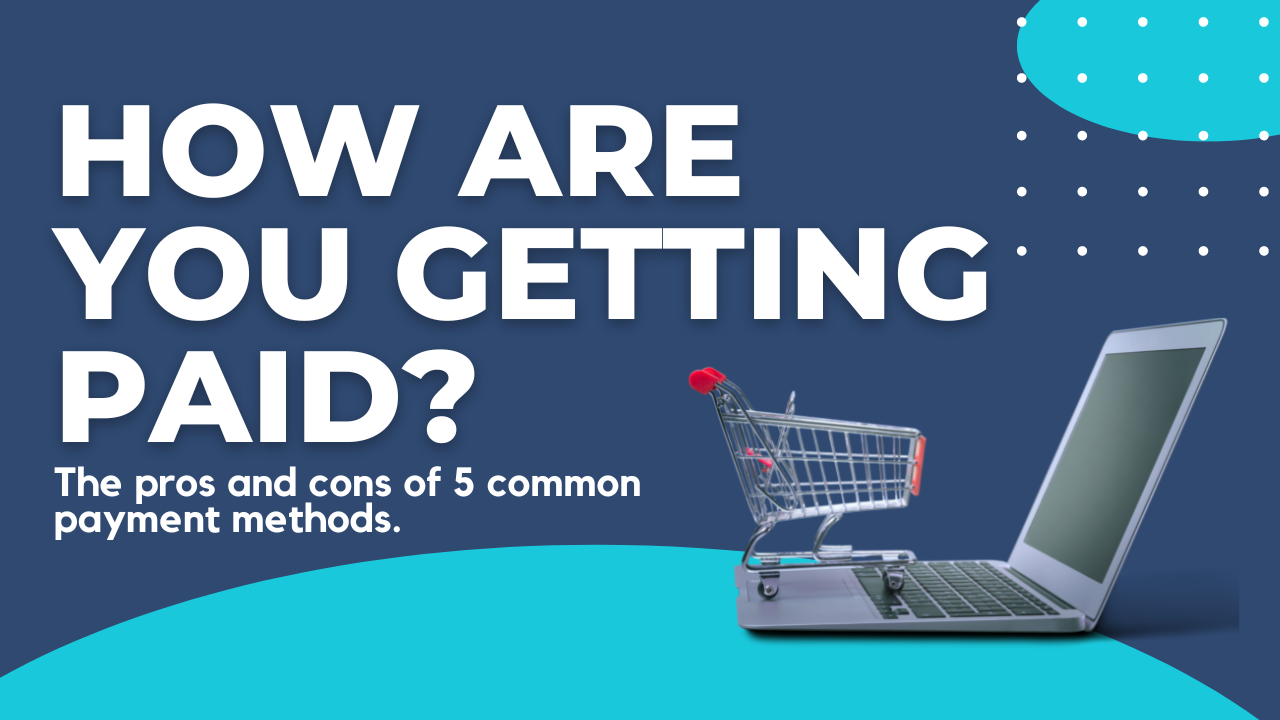
Will that be cash or charge?
When was the last time you heard that phrase? Or - and here’s a bigger throwback for you - when someone asked if you wanted to pay by check? It seems wild that just twenty years ago, we could walk into the mall (remember those?) and leave with a new pair of shoes simply by putting our John Hancock on a slip of paper (with the logo of our favorite football team in the background) that may or may not clear once it hit the bank.
How we pay for things continues to evolve, and as a small business owner, you must understand how these changes affect your bottom line. (Spoiler alert: It ALL affects your bottom line.) We now have cash, credit cards, debit cards, ACH payments, checks, mobile wallets, and various peer-to-peer payment and online platforms to choose from.
So which ones should you accept? And which of them should you kick to the curb?
The jerk-knee response is, “take them all,” right? You want to make it as convenient as possible for the most peop...
Under Promise and Over-Deliver... Strategically
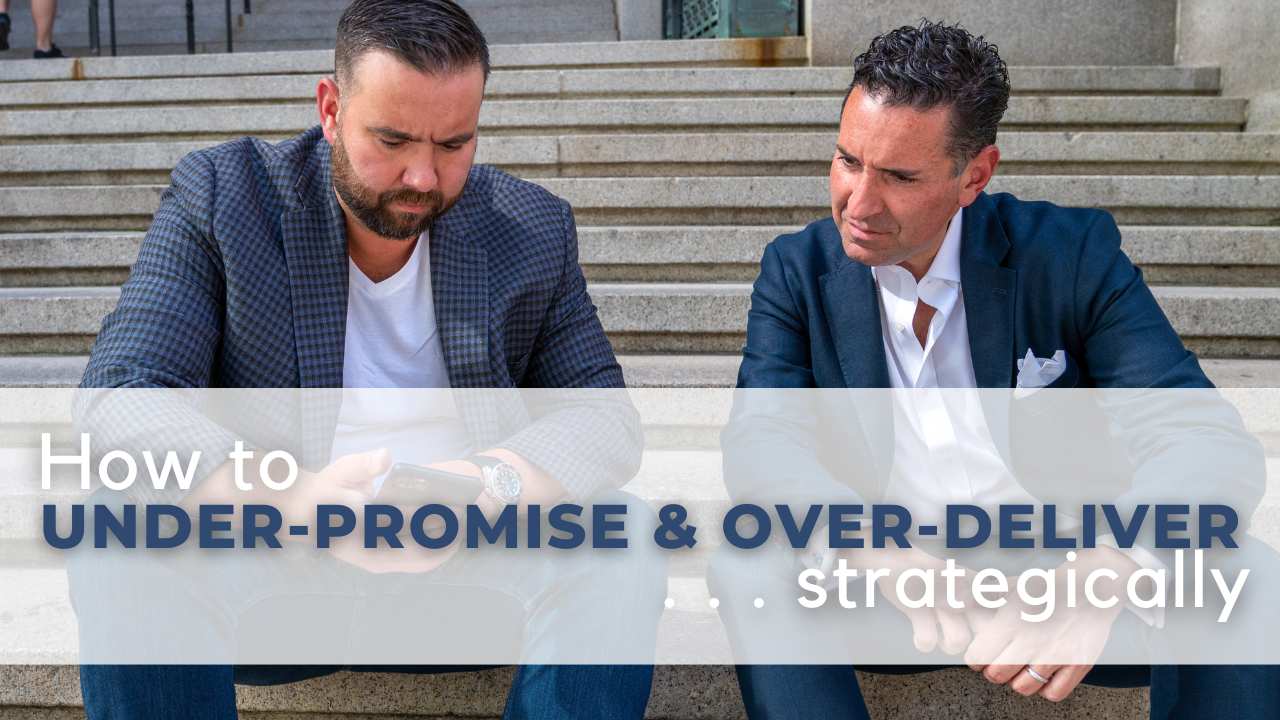
Under promise and over-deliver.
This seems like a wise bit of advice, no?
Most of us, at one point in our careers, have made the mistake of making guarantees we had no business making. Whether from overinflated confidence, a complete lack of awareness, or just wishful thinking, you promised the moon - and then suffered the fallout when you fell short of those promises.
Likewise, we’ve all been on the other side of the coin (or the dark side of the moon, if you will). You’ve placed your trust, confidence, and money in a person or business that promised one thing but delivered something very different. Were you a repeat customer after that? Probably not. You got burnt - and it sucks.
It’s not rocket science.
Anyone in the business of consistently overselling and under-delivering will likely not be in business very long. At least, not without the help of a very, very good marketing team.
But does this mean that doing the opposite of underpromising and over-delivering will have the...
The Best Investment on Earth is Earth

One of the routes to financial independence is via real estate. To fully appreciate the value of real estate participation is to utilize the tax benefits associated with real estate investing.
This week we are revealing one of the best-kept secrets in America!
The benefits of a Cost Segregation Study are undeniable. Cost segregation is a tremendously beneficial and widely used tax strategy for residential development and commercial property owners. This technique can significantly reduce taxable income, which in turn increases cash flow - formerly a tool used by the largest accounting firms and real estate owners. It has become routine among almost every size business! Nearly every person who owns or operates any type of real estate can benefit from using Cost Segregation!
HOW DOES IT WORK?
By identifying and placing the various individual assets purchased in a real estate transaction into their proper shorter 5, 7, or 15-year depreciation lives (rather than on a 39-year life fo...
A Due Diligence Deep Dive
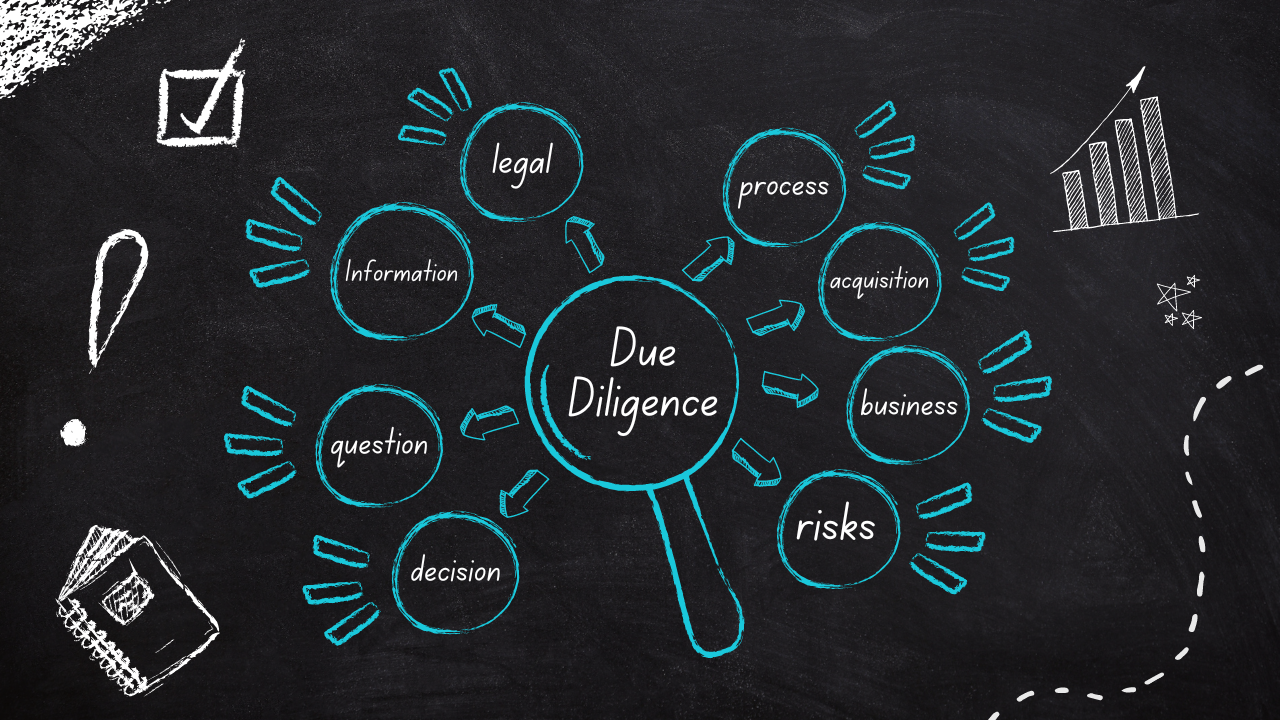
If you’re someone who hated homework in high school - we’ve got some bad news for you.
The expression “what you don’t know can’t hurt you” might be valid for a lot of things, but when it comes to buying a business, what you don’t know is precisely what could bite you in the ass.
Performing due diligence is one of the most critical steps when purchasing a business. I don’t care if the dude you’re buying from is your brother’s best friend’s sister’s step-uncle, who you’ve known since you were in diapers. You should always, ALWAYS, do your homework before making anything official. A misrepresentation of facts or figures - intentional or otherwise - is always a possibility. Protect yourself from agreeing to a crap deal. Remember, it's not personal - it’s business.
When is it done?
Due diligence is typically one of the final phases of your business acquisition journey. You’ve already scoped out what you want to buy, spoken with the owner, made an offer, and negotiated the price and ...
The ABC's of Small Business

Your business is in a constant state of evolution. Workflows can be improved; sales increased; processes honed; client experiences enhanced. Vertically. Horizontally. Improvement is a continuous pursuit.
The history of the Oxford English Dictionary is an ideal example of this mindset. Googling a word’s meaning or – gulp – leafing through an actual paperbound dictionary is somewhat of a luxury. When the Philological Society of London members decided, in 1857, that existing English language dictionaries were incomplete and deficient, they called for a complete re-examination of the language. While they knew they were embarking on an ambitious project, they didn’t realize the full extent of the work they initiated or how long it would take to achieve the final result.
The project proceeded slowly after the Society’s first grand statement of purpose. Eventually, in 1879, the Society agreed with the Oxford University Press and James A. H. Murray to begin work on a New English Dictionary...



